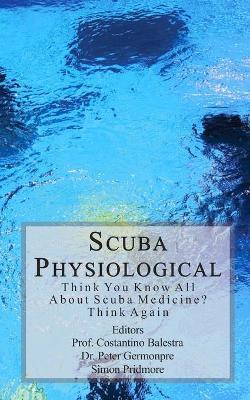Scuba Physiological: Think You Know All About Scuba Medicine? Think again!

Scuba Physiological: Think You Know All About Scuba Medicine? Think again!
If you are a diver, what you learned about topics such as decompression sickness and narcosis in your scuba diving classes is unlikely to have been as complete as you thought. Most of it will have been over-simplified and some of it will just have been plain wrong, as diver training agency texts have not kept pace with the science. Scuba Physiological gives you a chance to catch up.A recent book called The Science of Diving was a collation of work done by scientists in the field of decompression research as part of a three-year project called PHYPODE (Physiology of Decompression). The book did not reach the diving public; mainly because it was written by scientists for other scientists and they speak a different language than most of us. Simon Pridmore is not an expert on diving medicine but he knows something good when he sees it. When Simon read The Science of Diving (with help from Google), he thought it was worthwhile working on it to try to make it more accessible. The original authors agreed that this was a good idea and Scuba Physiological is the result.There have been great advances to make diving safer, but, despite nearly 170 years of research, the fundamental nature of decompression sickness and decompression stress remains unknown and there are still glaring gaps in our knowledge. Scuba Physiological provides a good summary of what we know, as well as a glimpse of where the science is taking us and some invaluable tips to make you a safer diver now.Among many other things, you will learn: 1. Pre-dive hydration, exposure to heat, whole body vibration and oxygen breathing may reduce the risk of DCS.2. Post-dive, our bodies have most bubbles running around them 30 to 40 minutes AFTER we have surfaced. Post-dive hydration and certain other post-dive behaviours are therefore also essential.3. The effects of nitrogen narcosis continue for a period of time AFTER a dive.4. All dive computers have a known DCS risk rate.5. Exercise during the period up to 120 minutes after surfacing may increase your risk of DCS.6. Never use a weightlifter's breath-hold and release technique when pulling yourself into the boat post-dive.7. A little dark chocolate before a dive may be a good thing for you.What the experts say: "With this latest volume, Simon Pridmore makes a significant contribution to the body of practical knowledge in the science of scuba diving. If you are looking for a thorough understanding of the science of diving and how it might be impacting y
PRP: 116.17 Lei
Acesta este Pretul Recomandat de Producator. Pretul de vanzare al produsului este afisat mai jos.
104.55Lei
104.55Lei
116.17 LeiLivrare in 2-4 saptamani
Descrierea produsului
If you are a diver, what you learned about topics such as decompression sickness and narcosis in your scuba diving classes is unlikely to have been as complete as you thought. Most of it will have been over-simplified and some of it will just have been plain wrong, as diver training agency texts have not kept pace with the science. Scuba Physiological gives you a chance to catch up.A recent book called The Science of Diving was a collation of work done by scientists in the field of decompression research as part of a three-year project called PHYPODE (Physiology of Decompression). The book did not reach the diving public; mainly because it was written by scientists for other scientists and they speak a different language than most of us. Simon Pridmore is not an expert on diving medicine but he knows something good when he sees it. When Simon read The Science of Diving (with help from Google), he thought it was worthwhile working on it to try to make it more accessible. The original authors agreed that this was a good idea and Scuba Physiological is the result.There have been great advances to make diving safer, but, despite nearly 170 years of research, the fundamental nature of decompression sickness and decompression stress remains unknown and there are still glaring gaps in our knowledge. Scuba Physiological provides a good summary of what we know, as well as a glimpse of where the science is taking us and some invaluable tips to make you a safer diver now.Among many other things, you will learn: 1. Pre-dive hydration, exposure to heat, whole body vibration and oxygen breathing may reduce the risk of DCS.2. Post-dive, our bodies have most bubbles running around them 30 to 40 minutes AFTER we have surfaced. Post-dive hydration and certain other post-dive behaviours are therefore also essential.3. The effects of nitrogen narcosis continue for a period of time AFTER a dive.4. All dive computers have a known DCS risk rate.5. Exercise during the period up to 120 minutes after surfacing may increase your risk of DCS.6. Never use a weightlifter's breath-hold and release technique when pulling yourself into the boat post-dive.7. A little dark chocolate before a dive may be a good thing for you.What the experts say: "With this latest volume, Simon Pridmore makes a significant contribution to the body of practical knowledge in the science of scuba diving. If you are looking for a thorough understanding of the science of diving and how it might be impacting y
Detaliile produsului








